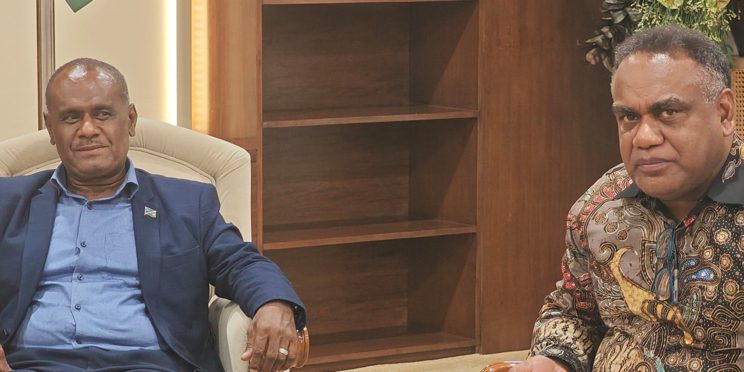The Solomon Islands’ stance on West Papua is rooted in dialogue and consultation rather than confrontation.
Prime Minister (PM) Jeremiah Manele told media before departing for Indonesia on Thursday.
PM Manele, along with other Melanesian Spearhead Group (MSG) leaders, was invited to attend the inauguration of Indonesia’s new President, Prabowo Subianto, and Vice President, Gibran Rakabuming Raka, scheduled for Sunday, October 20th.
Addressing the West Papua issue, PM Manele stressed two key concerns: human rights and self-determination.
He acknowledged the region’s ongoing pursuit of political independence, stating, “We have the C24 (UN Special Committee on Decolonization) that addresses self-determination for territories.”
PM Manele said Solomon Islands recognizes Indonesia’s sovereignty.
He suggested that West Papua’s bid for self-determination must be approached through dialogue and consultation with Indonesia.
Regarding human rights, Manele stated, “We consistently use opportunities to raise concerns with Indonesia through dialogue, stressing that human rights issues in West Papua must be addressed.”
The Prime Minister further mentioned concerns about land rights and access to resources, underscoring that these are internal matters for Indonesia to address.
He noted, “Our national position on human rights is that states must address them within the framework of international bodies such as the UN Commission on Human Rights.
“The Pacific Islands Forum and MSG have urged Indonesia to allow a visit from the UN Human Rights Commission.”
PM Manele also pointed out that Indonesia is becoming an increasingly important bilateral partner for the Solomon Islands.
He referenced Indonesia’s contributions, including the construction of the Friendship Hall for the 2023 Pacific Games, the nearly completed Burns Creek Clinic, and scholarships for Solomon Islands students.
“We have an Embassy in Jakarta, and Indonesia remains a valuable partner,” he said.
West Papua, located on the western rim of the Pacific and bordering Papua New Guinea, is a Melanesian region with a long history of tension and conflict over its political status.
After Dutch colonial rule, West Papua was transferred to Indonesia in 1963 following a brief period of UN administration.
A condition of this transfer was an internationally supervised act of self-determination, which resulted in the controversial “Act of Free Choice” in 1969.
The referendum, widely criticized as unrepresentative and undemocratic, was nonetheless accepted by the United Nations General Assembly, effectively recognizing Indonesia’s rule over the territory.
Since then, West Papua has witnessed one of the most prolonged and complex conflicts in the Pacific region.
The movement for independence evolved significantly after the fall of Indonesian President Suharto in 1998, transitioning from a guerrilla-based struggle to a more organized, nonviolent civilian movement within cities and towns.
By EDDIE OSIFELO
Solomon Star, Honiara









